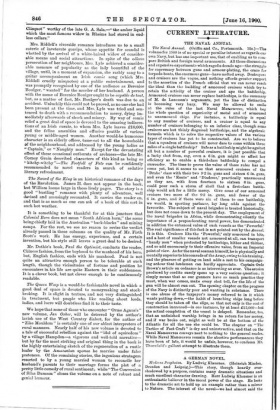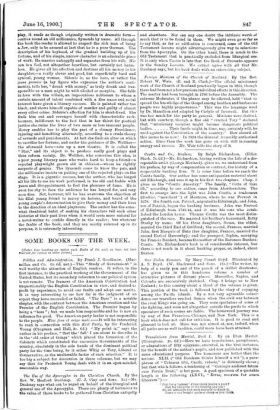A GERMAN NOVEL.
Moderne Propheten. By Ludwig Klausner. (Heinrich Minden, Dresden and Leipzig.)âThis story, though heavily over- shadowed by a purpose, contains many dramatic situations and much excellent character drawing. Herr Ludwig Klausner is an enthusiastic believer in the moral power of the stage. He looks to the dramatic art to hold up an example rather than a mirror to Nature. The interest of the novelâwe had almost said the play, it reads as though originally written in dramatic formâ centres round an old millionaire, Symonds by name. All through the book the reader is allowed to suspect the rich man of being a Jew, only to be assured at last that he is a pure German. The description of his boyhood, of the gradual building up of his fortune, and of his simple, narrow character is an admirable piece of work. He marries unhappily and separates from his wife. His son is a fool, not altogether heartless, but certainly not harm- less. He gives all his affection and destines all his money to his daughter,âa really clever and good, but superficially hard and cynical, young woman. Sidonie is, as the hero, or rather the jeune premier (a lay figure who expresses the author's senti- ments), tells her, "drunk with money," as truly drunk and irre- sponsible as a man might be with alcohol or morphia. She falls in love with the villain, an impecunious nobleman to whom a certain amount of talent combined with a fine name and social Interest have given a literary success. He is painted rather too black, and shows himself capable of murder and guilty of almost every other crime. Sidonie's affection for him is short-lived. She finds him out and revenges herself with characteristic reck- lessness, indifferent to the fact that in her thirst for poetical justice she ruins the lives of two more or less innocent people. Money enables her to play the part of a clumsy Providence, injuring and benefiting alternately, according to a crude theory of rewards and punishments. At last she finds an altar on which to sacrifice her fortune, and under the guidance of Dr. Waltherâ the aforesaid heroâsets up a new theatre. It is called the "Star," and its object is to produce really good plays and thua reform society. Dr. Welther, who conceives this idea, is a poor young literary man who works hard to keep a friendâa rejected playwright grown old in oblivionâwhom he rightly suspects of genius. The Symonds come to know the pair, and the millionaire insists on putting one of the rejected plays on the stage. It is a gigantic success, but the author, who has longed all his life to see his work performed, is too old and feeble with years and disappointment to feel the pleasure of fame. He is even too shy to face the audience he has longed for, and very soon dies. Not, however, till he has overcome the objection of his filial young friend to marry an heiress, and heard of the young couple's determination to give their money and their lives to the direction of an ideal playhouse. The author has the some- what theatrical habit of making his characters tell each other histories of their past lives when it would seem more natural for a novel-writer to confide directly in the reader ; but whatever the faults of the book, and they are mostly summed up in its purpose, it is extremely interesting.







































 Previous page
Previous page